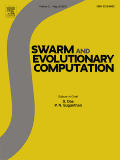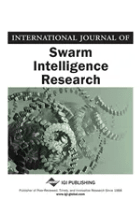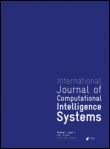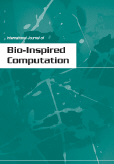
Swarm and Evolutionary Computation
Scope & Guideline
Transforming Complex Challenges into Opportunities.
Introduction
Aims and Scopes
- Swarm Intelligence Techniques:
The journal emphasizes research on algorithms inspired by the behavior of natural swarms, such as ant colonies, bee swarms, and flocks of birds, focusing on their application in optimization problems. - Evolutionary Algorithms:
It covers a wide range of evolutionary algorithms, including genetic algorithms, differential evolution, and memetic algorithms, particularly their adaptations and hybridizations for solving complex optimization problems. - Multi-objective Optimization:
A significant focus is placed on multi-objective optimization, exploring techniques that help in finding optimal trade-offs among conflicting objectives, which is crucial in real-world applications. - Hybrid Methods:
The journal highlights research on hybrid methods that combine various optimization techniques, including machine learning, metaheuristics, and swarm intelligence, to enhance performance in solving complex problems. - Applications in Diverse Fields:
Research articles often showcase applications of swarm and evolutionary algorithms across various domains, including engineering, logistics, healthcare, and artificial intelligence, demonstrating their versatility and effectiveness. - Theoretical Foundations:
The journal also publishes theoretical studies that advance the understanding of algorithmic performance, convergence properties, and the mathematical underpinnings of swarm and evolutionary techniques.
Trending and Emerging
- Deep Learning Integration:
There is a growing trend in integrating deep learning techniques with evolutionary algorithms and swarm intelligence, which facilitates enhanced optimization capabilities, particularly in complex, high-dimensional spaces. - Reinforcement Learning Approaches:
Research combining reinforcement learning with evolutionary computation is on the rise, showcasing how these methodologies can complement each other for improved adaptive optimization in dynamic environments. - Surrogate-Assisted Optimization:
Surrogate models are increasingly being utilized to enhance the efficiency of evolutionary algorithms, particularly in expensive optimization scenarios, reflecting a shift towards more resource-efficient techniques. - Real-time and Adaptive Optimization:
A significant increase in research focusing on real-time optimization and adaptive algorithms that can respond to changing conditions and requirements in various applications is evident. - Hybrid Multi-objective Optimization Techniques:
There is a notable trend towards hybrid approaches that combine multiple optimization strategies to tackle complex multi-objective problems, indicating a shift towards more sophisticated and versatile solutions. - Applications in Emerging Technologies:
The journal is seeing more applications of swarm and evolutionary algorithms in emerging fields such as IoT, smart manufacturing, and healthcare, reflecting the growing importance of these technologies in addressing contemporary challenges.
Declining or Waning
- Traditional Genetic Algorithms:
There has been a noticeable decrease in the publication of research solely focused on traditional genetic algorithms without integration or hybridization with other techniques, indicating a shift towards more innovative approaches. - Basic Swarm Optimization Techniques:
Simple implementations of swarm optimization methods, such as basic Particle Swarm Optimization (PSO) without enhancements or adaptations, appear less frequently, as researchers move towards more complex and hybridized methodologies. - Single-objective Optimization Problems:
There is a diminishing focus on single-objective optimization problems, as the research community increasingly emphasizes multi-objective and many-objective optimization challenges, reflecting a broader trend towards addressing complex real-world scenarios. - Static Problem Assumptions:
Research assuming static problem conditions is becoming less common, as the field progresses towards dynamic optimization problems that account for changing environments and constraints.
Similar Journals

NETWORK-COMPUTATION IN NEURAL SYSTEMS
Bridging Theory and Practice in Neural Network ResearchNETWORK-COMPUTATION IN NEURAL SYSTEMS is a distinguished journal published by Taylor & Francis Inc, focusing on the innovative intersection of network theory and neural computation. Since its inception in 1990, this journal has provided a vital platform for researchers and professionals in the field of neuroscience, exploring the dynamics of neural networks and computational models. With its current Q3 category ranking in Neuroscience (miscellaneous) and a robust position in Scopus, the journal plays a critical role in advancing knowledge and discussion within this interdisciplinary area. The journal addresses a wide range of topics related to the computational aspects of neural systems, fostering collaboration and providing valuable insights amongst scholars. Although it is not an open-access publication, its well-curated content remains accessible through institutional subscriptions, ensuring that significant research reaches the hands of those who need it. As it continues to evolve through 2024 and beyond, NETWORK-COMPUTATION IN NEURAL SYSTEMS stands as a key resource for anyone deeply engaged in understanding the complexities and intricacies of neural computations.

International Journal of Swarm Intelligence Research
Advancing Knowledge in Artificial Intelligence DynamicsInternational Journal of Swarm Intelligence Research, published by IGI Global, stands at the forefront of research in the dynamic field of artificial intelligence, focusing specifically on swarm intelligence and its applications. With an ISSN of 1947-9263 and an E-ISSN of 1947-9271, this journal has carved a niche within academia since its inception, boasting a commendable Q3 rank in the categories of Artificial Intelligence, Computational Theory and Mathematics, and Computer Science Applications as of 2023. The journal spans vital research from the years 2017 to 2024, fostering an environment that welcomes innovative studies that apply natural systems principles to computational methodologies. Although not classified as Open Access, the journal remains accessible to a broad audience, providing vital insights and fostering discussion among researchers, professionals, and students delving into cutting-edge swarm intelligence topics. As such, this journal is an essential resource for those aiming to advance their understanding and application of these transformative technologies.

Genetic Programming and Evolvable Machines
Unleashing the Power of Genetic AlgorithmsGenetic Programming and Evolvable Machines, published by SPRINGER, is a leading journal dedicated to the fields of genetic algorithms, evolutionary computation, and machine learning. With an ISSN of 1389-2576 and an E-ISSN of 1573-7632, this esteemed journal encompasses original research articles, reviews, and applications that explore the intricate relationships between intelligent systems and evolutionary processes. As of 2023, it holds a notable Q2 ranking in various categories including Computer Science Applications and Hardware and Architecture, reflecting its significant impact in advancing knowledge and methodologies within these domains. The journal's metrics, including a top rank of #31/130 in Theoretical Computer Science, signify its relevance and contribution to the broader academic community. Though not open access, papers published in the journal continue to serve as critical resources for both researchers and practitioners, promoting innovative methodologies and solutions. Covering a broad scope with a convergence extending from 2003 to 2024, this journal remains a pivotal platform for sharing cutting-edge research that shapes the future of artificial intelligence and computational theory.

JOURNAL OF COMBINATORIAL OPTIMIZATION
Bridging theory and application in combinatorial studies.JOURNAL OF COMBINATORIAL OPTIMIZATION, published by Springer, stands at the forefront of research in the fields of applied mathematics, computational theory, and combinatorial optimization. With an ISSN of 1382-6905 and E-ISSN of 1573-2886, this esteemed journal serves as a vital platform for groundbreaking studies and methodologies from 1997 to 2024. Notably positioned in the Q3 quartile across several categories, including applied mathematics and discrete mathematics, it reflects a commitment to high-quality research that pushes the boundaries of knowledge in quantitative analysis and algorithm development. Although it does not offer open access, its visibility and impact are underscored by impressive Scopus rankings, such as the 67th percentile in discrete mathematics and combinatorics. The journal aims to foster a comprehensive understanding of combinatorial optimization and its applications, making it an indispensable resource for researchers, professionals, and students eager to stay abreast of the latest trends and advancements in these dynamic disciplines.

Memetic Computing
Advancing the Frontiers of Computational InnovationMemetic Computing is a premier academic journal published by SPRINGER HEIDELBERG, dedicated to advancing research in the interdisciplinary domains of computer science and control optimization. With an impact factor that places it in the prestigious Q1 category for both Computer Science and Control and Optimization as of 2023, Memetic Computing stands at the forefront of innovation, offering researchers, professionals, and students a vital platform to explore and disseminate transformative findings in these rapidly evolving fields. With convergence periods specified from 2009 to 2024, the journal aims to illustrate the synergy between algorithmic and natural systems, reflecting current trends and future trajectories within the scope of memetic algorithms. Its robust Scopus rankings signal its significance as an influential resource within the global academic community. This journal is invaluable for those looking to enhance their understanding and engage with cutting-edge research that blends computational theory with practical applications.

NEURAL COMPUTING & APPLICATIONS
Charting New Territories in Neural Computing ResearchNEURAL COMPUTING & APPLICATIONS is a premier journal dedicated to the burgeoning fields of Artificial Intelligence and Software Engineering, published by Springer London Ltd. Established in 1993, the journal serves as a pivotal platform for disseminating cutting-edge research and innovative applications in neural computing, covering a broad range of topics from algorithm development to real-world applications. With its impressive categorization in the 2023 Journal Quartiles—ranging Q2 in Artificial Intelligence and Q1 in Software—it stands out in its discipline, ranking 42nd out of 407 in Computer Science Software and 50th out of 350 in Computer Science Artificial Intelligence, reflecting its significant impact in the academic community. Although not an open access journal, it provides vital access to significant findings and methodologies that drive advancements in technology. Researchers, professionals, and students looking to stay abreast of the most relevant and impactful developments in these fields will find NEURAL COMPUTING & APPLICATIONS an indispensable resource.

ALGORITHMICA
Exploring Innovative Solutions in Algorithm DesignALGORITHMICA is a premier academic journal published by SPRINGER, dedicated to the field of algorithms and their applications across various domains. With an ISSN of 0178-4617 and an E-ISSN of 1432-0541, this journal serves as a vital resource for researchers and practitioners interested in the theoretical and practical aspects of algorithmic design and analysis. Recognized for its high impact, ALGORITHMICA is listed in the top quartile (Q1) for Applied Mathematics and Computer Science (miscellaneous) and is positioned in Q2 for Computer Science Applications in the 2023 category rankings. The journal has continuously contributed to advancing knowledge from its inception in 1986 to its ongoing publications through 2024. With a commitment to rigorous peer review and high-quality research, ALGORITHMICA is essential for anyone serious about pushing the boundaries of algorithmic study and application.

International Journal of Computational Intelligence Systems
Connecting Researchers with Cutting-Edge InsightsInternational Journal of Computational Intelligence Systems, published by SPRINGERNATURE, is a leading open-access journal that has been at the forefront of research in the field of computational intelligence since 2008. With an ISSN of 1875-6891 and an E-ISSN of 1875-6883, this journal occupies a prominent place in the academic landscape, achieving impressive rankings in its categories: Q2 in both Computational Mathematics and Computer Science (miscellaneous), reflecting its significance and relevance to researchers, professionals, and students. Based in Switzerland, the journal is committed to disseminating high-quality research and fostering innovation in computational methodologies, algorithms, and applications. Its strong impact factor and Scopus rankings—31/189 in Computational Mathematics and 53/232 in General Computer Science—underscore its critical role in advancing knowledge in these interdisciplinary fields. As an open-access journal, it provides unparalleled accessibility to cutting-edge research, supporting the global community in staying at the forefront of computational intelligence advancements.

Natural Computing
Harnessing Nature's Power for Cutting-Edge SolutionsNatural Computing is a leading peer-reviewed journal published by Springer, focusing on the interdisciplinary study of natural computation methods and their applications across various domains. With an ISSN of 1567-7818 and an E-ISSN of 1572-9796, this journal has established itself as vital in the field of Computer Science Applications, as reflected in its esteemed Q2 quartile ranking and a Scopus rank of #358 among 817 journals, placing it in the 56th percentile. Based in the Netherlands, Natural Computing covers a diverse range of topics, including computational models inspired by natural systems, evolutionary algorithms, and swarm intelligence. Seeking to bridge the gap between theoretical research and practical applications, this journal serves researchers, professionals, and students by providing insights and advancements in the field. With a commitment to fostering innovation, Natural Computing aims to push the boundaries of understanding in computational methods inspired by nature, making it an essential resource for those looking to contribute to and stay updated within this dynamic area.

International Journal of Bio-Inspired Computation
Harnessing Nature's Strategies for Intelligent SolutionsInternational Journal of Bio-Inspired Computation, published by INDERSCIENCE ENTERPRISES LTD, is a leading platform dedicated to advancing research in the fields of bio-inspired computing and its applications. With a robust ISSN of 1758-0366 and E-ISSN of 1758-0374, this journal contributes significantly to the discourse in Computer Science, particularly emphasizing theoretical and practical frameworks that mirror natural processes. Situated in Switzerland, this peer-reviewed journal operates under a rigorous editorial process, ensuring high-quality publications that attract considerable attention, as evidenced by its placement in the Q2 category for 2023 in General Computer Science and Q3 in Theoretical Computer Science. With Scopus rankings reflecting its growing influence—ranked #62 out of 232 in General Computer Science and #36 out of 130 in Theoretical Computer Science—this journal invites researchers, professionals, and students to explore innovative methodologies and development in bio-inspired technologies. Although it currently does not adopt an open-access model, the journal remains committed to disseminating vital research that fuels advancements in computational intelligence, fostering collaboration and knowledge exchange in the ever-evolving landscape of computing.